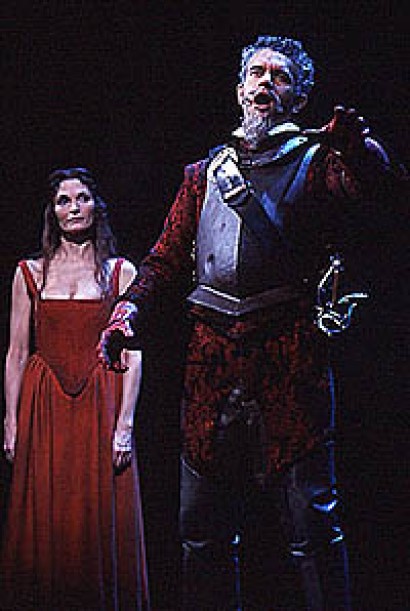
A reluctant patron, entering Broadway's intimate Martin Beck, commented "its so Sixties, you know, protest and all that." But here we are, 40 years later, our country again embroiled in a war few understand and many fear. We certainly need a dose of idealism and hope now, as we did in l965, when Richard Kiley starred in Dale Wasserman's play, based on Miguel Cervantes' l615 novel, "Don Quixote de la Mancha." The musical, with its Spanish-tinged score by Mitch Leigh and Joe Darion, ran an amazing 2328 performances.
Brief, blessed relief from today's reality is what this uplifting, gritty and glorious musical offers. When Brian Stokes Mitchell, as the imprisoned poet, Cervantes, takes center stage in the persona of Don Quixote, looks off into the distance and delivers the show's famous anthem, "The Impossible Dream", in a voice full of emotion, determinism and conviction, hearts stop, and the roar of approval from the house fills the theater in affirmation of the moment well beyond the context of the show.
A political prisoner and tax collector (he slapped a lien on a church for not paying its taxes), Cervantes is thrown into jail and awaits his "interrogation" at the merciless hands of the Spanish Inquisitors. All he has with him is his devoted sidekick, Sancho (Ernie Sabella), and his most prized possession, the manuscript of a play he has written, "Don Quixote de la Mancha." To pass the time and save himself from the disagreeable mob of fellow prisoners, he enlists them as players in his reenactment of the tale of an aging nobleman who sets upon a journey doing good deeds to earn knighthood. Don Quixote chances upon a disreputable Inn which, in his mind's eye, he sees as a castle, the lord of which (Don Mayo) can knight him. He imagines the scullery maid, Aldonza (Mary Elizabeth Mastrantonio), as the lady Dulcinea, whose "token" (a rag from the laundry) he must carry into battle to earn his knighthood. He usurps a shaving bowl from a visiting barber (a marvelous Jamie Torcellini) and makes it his helmet. Sanchez is aware of his sire's proclivity towards fantasy but devotedly goes along with it. The nobleman's family is determined to find and return him home before he sullies his name, gives away his fortune, and embarrasses his niece, Antonia (Natascia Diaz) and her snobbish, fortune-hunting fiance (Strephen Bogardus).
The doddering old knight wreaks havoc on those he is trying to help, namely Aldonza, who eventually becomes captivated by his treatment of her as a lady. This incurs the wrath and brutality of the men who are expecting her "favors." His many battles eventually weaken him, and his family intercedes and brings the broken old man back to reality and his deathbed. He lies there, defeated, when Aldonza appears and, as Dulcinea, rekindles the impossible dream.
The show is blessed with a score that has many delightful songs tied to the context of the book, among them: "We're Only Thinking of Him" a marvelously cynical confession by the old man's niece, housekeeper and son-in-law masking their self obsession in phony altruism, the gorgeous love song "Dulcinea" and "To Each His Dulcinea," the pensive "What Does He Want of Me?", "I Really Like Him" and, later, "A Little Gossip" by the loveable Sanchez, and the rousing "Knight of the Woeful Countenance." But the outstanding and surviving "Dream" invests the show with its deserved immortality.
Sabella is a worthy servant whose comic talent compensates for his vocal weakness. Don Mayo is outstanding in his multiple roles as innkeeper/lord/fellow prisoner. The versatile Stephen Bogardus makes his mark as the son in law, sadistic rapist and prisoner. The weakest link, and an important one, is Mastrantonio as Aldonza/Dulcinea. The role requires an earth mezzo soprano voice but has been inexplicably given to a soprano so that she breaks register in every song, further impaired by tight, controlled acting. The clarion tenor of Mark Jacobi, as the padre, pierces through Paul Brown's most extraordinary set. A huge clanging metal wall of the jail/inn, the height of the theater, dark, cold and forbidding, tantalizingly cracks opens just enough for a dazzling glimpse of sun or stars outside. It is breathtaking, thanks to Paulo Gallo's dramatic lighting. A Julie Taymor-ish moment occurs to the audience's delight as a huge wheel and other mundane jailhouse objects are transformed before your eyes into a horse on which Don Quixote rides off to adventure. Luis Perez flexes his choreographic muscle from the sordid seductiveness of ruthless gypsies to the violent intensity of the rape scene in the inn.
Under Robert Billig's tutelage (with an assist by Tony Meola's comfortable sound design) the score never sounded better.The elements of a good musical are all there: a memorable score, multi-layered engrossing story (the juxtaposition of a play within a play within a play; the prisoner, his fable of a nobleman in whose delirium he becomes a knight) and a visually arresting production. But most of all its the ability of singer/actor Brian Stokes Mitchell to invest his roles from a rebellious poet/prisoner to doddering old dreamer to noble Knight of the Woeful Countenance with humor and humanity and seductive empathy.
It is time to dream the Impossible Dream, if only for a few hours.
